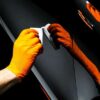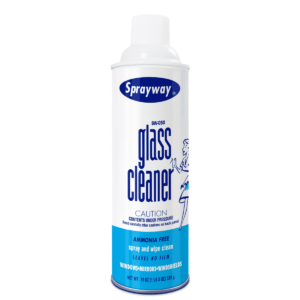What Is The Difference Between Ammonia Free and Ammonia Automotive Glass Cleaners?
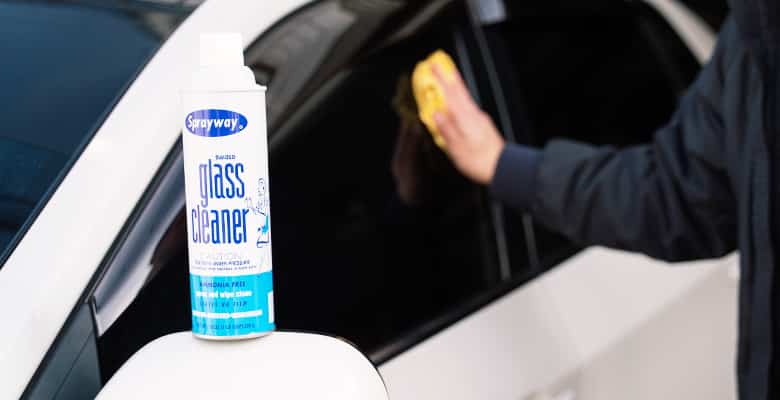
It might be surprising to hear that most glass cleaning products contain ammonia. These can be used when cleaning windows around the home, but when it comes to automotive glass, ammonia-based glass cleaners should be avoided at all costs.
Each type of glass cleaner has its advantages and disadvantages, and our guide to glass cleaners will help you decide which product is best for giving your windows a crystal-clear, streak-free finish.
What Is Ammonia?
In cleaning products, ammonia is commonly encountered in liquid form and heavily diluted with water. It is actually a colorless gas consisting of one atom of nitrogen and three atoms of hydrogen.
Why Is Ammonia Added To Glass Cleaners?
Ammonia has a favorable characteristic of evaporating rapidly. As it evaporates, it doesn’t leave behind residue that attracts dirt and dust. Because it evaporates quickly, it is less likely to leave streaks, which makes it a popular choice as an additive to glass cleaners.
Advantages of Ammonia Glass Cleaner
Here’s everything you wanted to know about the science behind ammonia-based glass cleaners.
Evaporates Quickly
Ammonia dries extremely quickly because of its high vapor pressure. This can prevent streaks from occurring as the product evaporates without drying on the window.
Powerful Cleaning Properties
It is extremely effective at breaking down animal fats and vegetable oils. Ammonia pulls the proton out of the stearic acid in grease and grime. This, in turn, converts the remaining hydrogen atoms to a negative charge, making them water-soluble, and easy to clean up.
Low-cost window cleaning option
Ammonia is cheaper to produce and the production process is relatively environmentally friendly. It is mercury-free, lead-free, doesn’t deplete the ozone layer. There is no denying that Ammonia is a powerful cleaner when it comes to grease, but it has significant disadvantages when it comes to cleaning windows and windshields on cars.
Problems/Risks of Ammonia-based Glass Cleaners
Ammonia-based glass cleaners are not without risks, however.
Can Cause Streaks If Applied In Direct Sunlight
Although ammonia glass cleaners are touted for their streak-free finish, if you are cleaning the glass in direct sunlight you will notice streaks appearing. This is due to the glass magnifying the heat of the sun, causing the ammonia to dry on its surface before the evaporation process begins. This is not only annoying, but streaks on your car’s windshield will create sun glare.
Can Damage Car Parts
When using products with ammonia in them, it’s important to keep in mind that the ammonia can damage paint, chrome trim, rubber seals, vinyl, and plastic – all of which can be found throughout your car. Damaging the seal around your windshield will compromise the structural integrity and strength of the windshield itself. Ammonia-based glass cleaners will degrade wax quickly and can ruin the hours you’ve spent detailing and polishing your vehicle.
Ruins Tinted Glass
Ammonia-based window cleaners should never be used on tinted glass. When ammonia is used on tinted windows it can cause the tint to bubble and discolor, become hazy or brittle. With prolonged use, the window tint will peel off completely.
Professionals use ammonia to old window tint to help remove it. Unless you’re trying to peel it off, ammonia-based cleaning products should be avoided for tinted glass.
Advantages of Ammonia-Free Glass Cleaners
Ammonia-free glass cleaners get the job done with the downsides associated with ammonia-based cleaners.
No Smell
After using ammonia-based cleaning products, the smell of ammonia will linger after the job is done.
A good ammonia-free glass cleaning product such as Sprayway Glass Cleaner will leave your glass smelling fresh, without any offensive scent.
Safe To Use On Most Window Types
Specially formulated ammonia-free car care products won’t damage your windows or window tint. It’s also kinder to surrounding components and won’t damage seals, vinyl, or your vehicle’s interior. The last thing you want to do when cleaning your car is to make things worse!
Industry Standard
Both professional car detailers and professional window tint companies use ammonia-free glass cleaners such as Sprayway Glass Cleaner due to their non-toxicity and versatility. Car windows are given a lot of attention throughout the detailing process because they attract a lot of dirt, grime, and insects. A dedicated glass cleaner is used that will consistently leave windows streak-free and looking transparent.
Just As Effective As Ammonia-Based Cleaners
A cleaning product is useless if it doesn’t work! Ammonia-free glass cleaning products are just as effective as their ammonia-based cousins. Instead of ammonia, they may use products like vinegar, alcohol, and specialized surfactants to naturally cut through grease and grime.
Disadvantages of Ammonia-Free Glass Cleaners
Occasionally, when people use ammonia-free glass cleaners for the first time they may complain of a streaky finish.
This is avoided with Sprayway Glass Cleaner because its foam action formula eliminates the chance of dripping or running greatly reducing the chances of a streaky finish.
Our high-quality ammonia-free glass cleaners are formulated precisely to dry rapidly without leaving residual streaks, removing dirt buildups with no risk of damaging the surrounding window seals.
Get A Squeaky-Clean Finish With Ammonia-Free Glass Cleaner
The choice is clear when it comes to automotive glass cleaning products. Ammonia-based glass cleaners should not be used to clean your car’s windshield or windows under any circumstances. You may cause damage to your windows or other surrounding components, as well as jeopardize your health!
Keep your ride clean and safe with Sprayway ammonia-free glass cleaner and enjoy a perfect view!
Recent Post
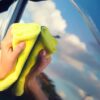
Water-based Cleaners vs Solvent-based...
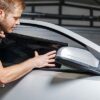
The Different Kinds of Tinted Windows...

The Different Kinds of Leather...
